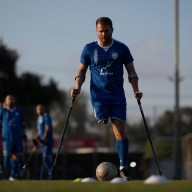 Medical researchers continue to make life-changing breakthroughs.
Medical researchers continue to make life-changing breakthroughs.
Credit: Thinkstock
Reporter was commissioned to write this in-depth article.
Researchers from the University of Pittsburgh Medical Center are turning heads with a novel new procedure – triggering hypothermia to buy critical time for dying patients. An upcoming clinical trial will have doctors draining the blood of trauma patients only to replace it with freezing saltwater, according to a New York Times report. If all goes well, the intervention could make the difference between life and death.
Medical professionals continue to surprise us with innovative new devices, therapies and procedures. Read on for some of the most buzzworthy new medical approaches.
Cue Health Tracker
Perhaps the coolest in-the-works medical device is Cue, an at-home health monitoring system that connects directly to your smartphone. The sleek device, which looks more like a piece of modern home décor, sits three inches tall and tracks information related to vitamin D levels, fertility, inflammation, influenza and testosterone.
Users simply supply a droplet of saliva, blood, or nasal swab into a single-use cartridge. Cue analyzes the sample in minutes and sends it via Bluetooth technology to a free smartphone app. From there, the app reveals individual data and suggests purposeful action. Have low vitamin D levels? Cue might recommend taking a stroll in the sunshine.
Company reps say that clinical trials will determine how it measures up to pricey lab tests performed by a doctor.
“Cue makes it easy to take measurements previously only available through your doctor, enabling people to unlock and guide the story of their bodies by fine-tuning their lifestyle changes based on their body’s molecular changes,” said Ayub Khattak, Cue co-founder.
The wellness device is currently available for pre-order via the Cue website for an initial shipment going out in 2015. (The people who receive it will be part of a clinical trial.) Once FDA-approved, Cue will retail for $300.
The SynCardia Total Artificial Heart
This year marked the 1,300th implant of the SynCardia Total Artificial Heart, a temporary intervention that serves as a bridge to a heart transplant. The technology eliminates the source and symptoms of end-stage heart failure by replacing weakening heart ventricles and all four heart valves.
The device, which serves as a placeholder for a new heart, also increases blood flow and helps repair vital organs damaged by heart failure. This, in turn, makes patients better candidates for a transplant.
Since its inception, the valves in the SynCardia Total Artificial Heart have yet to fail.
“The fact that we are able to fabricate such a vital organ in the human body, save over a thousand lives and empower individuals to walk, run, play and live relatively normal lives while awaiting a heart transplant is a powerful experience, and it is the very reason I got into medicine in the first place,” said Dr. Mark Plunkett, a surgeon who has implanted the device.
“I got into the medical profession to help people, and the success of this advanced technology is something I look to to remind myself why I pursued a career in medicine,” he said.
According to Dr. Mark Plunkett, some artificial heart recipients are able to run 5K races and many live relatively normal lives while awaiting heart transplantation.
New device for sleep apnea
People with obstructive sleep apnea now have a new treatment option in the way of an implantable pacemaker-like device. The sleep disorder, which causes people to repetitively stop breathing while sleeping, is dangerous and can lead to high blood pressure, increased incidence of stroke, and daytime sleepiness.
Experts say that on average, people with the condition stop breathing between 20 and 40 times an hour.
The current go-to treatment is known as CPAP (continuous positive airway pressure.) This therapy uses a mask that connects to a device that generates pressure and keeps the airway open. While effective for many, others have a hard time tolerating it. For starters, it can be uncomfortable, creating a sensation of claustrophobia.
The new device, created by Inspire Medical, is implanted directly into the chest and sends out an electrical impulse. This, in turn, stimulates the tongue to move forward, which opens up the airway behind it. People control the device with a handheld remote used to activate the therapy at bedtime.
“It is an exciting innovation in the sense that there are some people where nothing works and they have significant sleep apnea that impairs their life, and it impairs their performance,” said Dr. Meir Kryger, professor at Yale School of Medicine.
“They’re sleepy at work and they’re at risk for heart disease, stroke and so forth,” he said. “Having another option for patients where nothing else works is important.”
Daytime sleepiness can be one of the most dangerous side effects of sleep apnea, which affects roughly 18 million American adults. It was recently discovered that the driver in a fatal New York train crash last year suffered from the condition.















